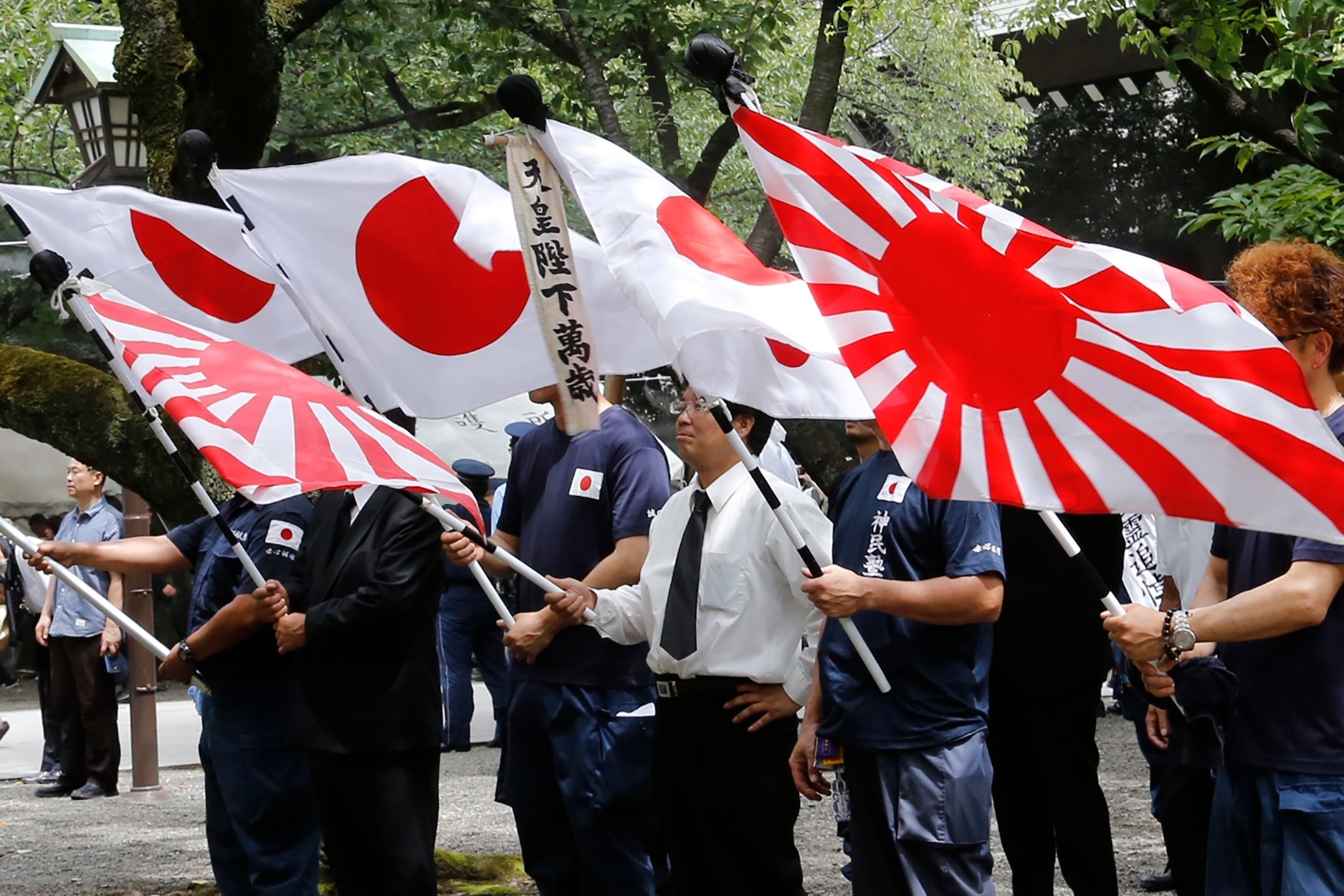South Korea formally requests Japan's 'rising sun' flag be banned at 2020 Olympics
In letter to IOC, South Korean ministry notes Fifa has already banned the emblem at international football matches

Your support helps us to tell the story
From reproductive rights to climate change to Big Tech, The Independent is on the ground when the story is developing. Whether it's investigating the financials of Elon Musk's pro-Trump PAC or producing our latest documentary, 'The A Word', which shines a light on the American women fighting for reproductive rights, we know how important it is to parse out the facts from the messaging.
At such a critical moment in US history, we need reporters on the ground. Your donation allows us to keep sending journalists to speak to both sides of the story.
The Independent is trusted by Americans across the entire political spectrum. And unlike many other quality news outlets, we choose not to lock Americans out of our reporting and analysis with paywalls. We believe quality journalism should be available to everyone, paid for by those who can afford it.
Your support makes all the difference.The South Korean government has asked the international Olympic authorities to ban the Japanese “rising sun” flag from next year’s Tokyo Games, saying it is an offensive reminder of colonial atrocities.
The flag, distinguishable from Japan’s simpler national emblem due to its 16 red rays of light emanating outwards from the sun at the centre, has been adopted by the nationalist right in Japan and drawn comparisons to the use of the Confederate flag in the United States.
South Korea’s ministry of culture, sports and tourism likened the flag to the Nazi swastika, saying it recalled “historic scars and pain” for Korean people just as the swastika “reminds Europeans of the nightmare of [the Second World War]”.
In a letter to the International Olympic Committee (IOC) president Thomas Bach, the ministry expressed “deep disappointment and concern” over the possibility of the flag being displayed in stadiums next summer.
The Tokyo 2020 organisers have previously dismissed the concerns of South Korean Olympic officials, saying the flag was widely used in Japan, was not considered a political statement and “it is not viewed as a prohibited item”.
The rising sun flag dates back hundreds of years, long before the period of Japan’s occupation of the Korean peninsula from 1910 until its Second World War defeat in 1945.
But it has been closely associated with the Japanese military since it was adopted as the war flag of the Imperial Japanese Army in 1870.
The rising sun became the ensign of the Imperial Japanese Navy in 1889, and is flown to this day by the Japanese Maritime Self-Defence Force, the navy’s modern-day equivalent – a cause of controversy last year that forced Japan to pull out of an international naval event in South Korea.
The flag is similarly reviled across the border in North Korea. At the time, state media in Pyongyang said allowing Japanese ships to take part in the naval event while flying the “war-crime flag” would be “an unbearable insult and ridicule to our people”.
The imperial connotations of the flag are little known in Europe and the US, however, and the emblem used to appear on cans of Asahi beer and other Japanese imported Japanese goods.
It featured prominently in a music video by the rock band Muse in 2013, until an uproar from fans in Asia prompted them to issue an apology and retract the video.
In its letter to the IOC, the South Korean ministry noted that Fifa has already set the precedent of banning the rising sun flag at international football matches.
“Furthermore, we emphasised that the use of the rising sun flag during the Tokyo Olympics would be a direct violation of the Olympic spirit promoting world peace and love for humanity, and that the IOC should have the Tokyo organising committee withdraw its (current) stance on the flag and prepare strict measures to prevent it from being brought to stadiums,” the letter said.
The controversy comes as just the latest test to frayed relations between the two nations. Also on Wednesday, South Korea complained to the World Trade Organisation that Tokyo’s introduction of restrictions on three materials critical to South Korea’s electronics industry were “politically motivated”, and therefore in breach of WTO rules.
Tokyo withdrew Seoul’s preferential trade status in relation to the materials after a South Korean court ordered Japanese companies to pay out damages over colonial-era forced labour.
At the heart of the row is the use of South Korean women and girls as “comfort women” in Japanese military brothels and South Korean men as slave labourers, war-time atrocities for which many in the Koreas believe Japan has never properly atoned.
Join our commenting forum
Join thought-provoking conversations, follow other Independent readers and see their replies
Comments